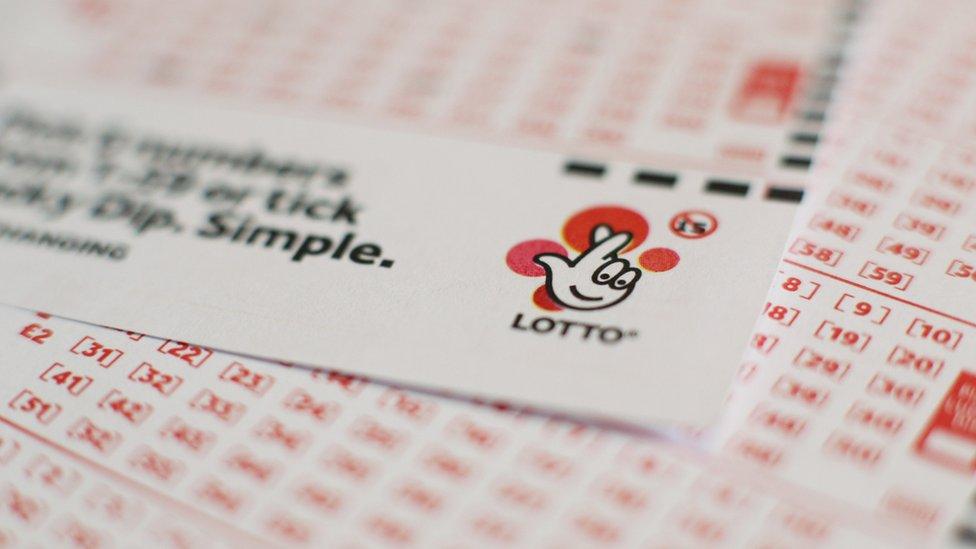Lottery: Do people have a predilection for multiples of 7?
- Published

People who picked five correct numbers in the latest Lotto draw have ended up winning just £15 each. Why?
Among the winning numbers for Wednesday night's Lotto were 7, 14, 21, 35 and 42. An "unprecedented" 4,082 people picked them correctly, according to Camelot.
This is roughly 80 times the usual number of people. The four previous draws had just 55, 36, 61 and 38 people getting five balls.
It meant the pot of £61,230 available had to be shared more widely than normal, the result being that the winners ended up with £15 each - less than the guaranteed £25 for getting three right.
Camelot doesn't give out details of the balls people choose - as opposed to those that win most often - but a spokeswoman admits multiples of seven, also including 28 and 49, are "hugely popular".
And while 4,082 people matched five numbers, no-one matched six, perhaps because the final number in the draw was 41 and thus not in the sequence of multiples.
A poll of 30,000 people carried out in 2014 by mathematician Alex Bellos, external seemed to confirm this with the number seven being ranked the most popular of all. it was followed by three, eight, four and five. Strangely, the number 13, considered unlucky by many in Western cultures, came sixth.
Polls consistently show seven as people's "favourite" number, says Bellos, author of Alex Through the Looking Glass: How Life Reflects Numbers, and Numbers Reflect Life. "Seven is the number most imbued with a mystical meaning throughout history. Everyone thinks they like seven because it's their number and 'unique' to them."
It's not of course, but Bellos believes the reason is because it does have some unique properties.
"It is arithmetically unique for the numbers between one and 10. People understand or intuitively sense seven's arithmetic uniqueness. It's the only number between one and 10 that you can't divide or multiply and have it stay in the group - one to 10."
This helps to explain why magicians and mind-manipulators like Derren Brown have long been able to take advantage of people's strong tendency to pick either three or seven when asked to name a number between one and 10.
With the significance of seven it's a short step to the choice of multiples of seven. "Maybe people like using multiples because they give some sense of order in what may otherwise seem chaotic," says psychologist Laverne Antrobus. "Or maybe the huge number of sevens is simply because the number has associations with good luck."
It also, in its multiples, gives a "nice balance" between odd and even numbers, she adds, and "fits in quite nicely", in terms of giving a decent span across the 59 balls used in Lotto draws.
Camelot says many players love sequences - even 1, 2, 3, 4, 5, 6, which are picked by a huge number of people, external - to take part in what is a random draw. Birthday-related numbers are also very popular.
Seven - a prime number - has plenty of cultural associations that might attract punters. There are that many days of the week and the texts of several religions, external mention the number frequently.
In 2004, the mathematician and author John Haigh, external wrote that, although information was sparse, the "most popular single choice" for Lotto contestants is "said to be those multiples of seven".
In October last year, Camelot raised the number of balls from 49 to 59. This pushed out the chance of picking six correct numbers - for the jackpot - from one in 14 million to one in 45 million. The company hasn't revealed what the payout per winner would have been had six multiples of seven come up.
"To put it into context," says a Camelot spokeswoman, "the four Lotto draws before this one had 55, 36, 61 and 38 Match 5 winners - so over 4,000 Match 5 winners is extraordinarily high. It is a lottery at the end of the day, and the prizes people win are determined by the balls drawn and the number of people who match those numbers. As a result, extremely rare events like this do happen."
The number seven and multiples thereof may have proved lucky this week, but, as 4,082 people are discovering, they haven't proved very lucrative.
Subscribe to the BBC News Magazine's email newsletter to get articles sent to your inbox.